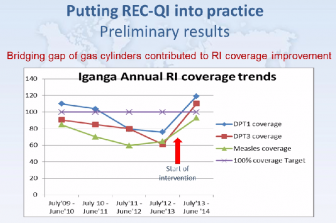Mar 12, 2012
Historical Analysis of the Comprehensive Multi-Year Plans in GAVI-Eligible countries
Immunization is a critical intervention for achieving the Millennium Development Goal of reducing deaths among children less than five years of age (MDG4) by two-thirds. More than 100 million children are vaccinated each year, protecting them against life-threatening diseases (WHO and UNICEF, 2010). Immunization is considered to be one of the ‘best buys’ in public health (WHO and UNICEF, 2010; World Bank 2010). Traditional vaccines cost pennies per dose and provide health benefits not only for the immunized child, but also for the community in which a child lives through herd immunity. In addition, studies have shown that immunization extends life expectancy and the time spent on productive activity later in life, thereby contributing to economic growth. Given the public goods aspect of immunization and its potential returns for growth and poverty reduction, this is an intervention definitely worth investment by governments. While newer vaccines are more expensive on a per dose basis, they have been shown to be highly cost-effective investments. The purpose of this analysis is to summarize historical trends in immunization costs and financing, both for routine services and campaigns, as countries have introduced new vaccines. The main audience for this document is national, regional, and global technical staff working on national immunization programs.Jan 1, 2014
Evaluation of Effective Vaccine Management for Senegal
A presentation of findings from the Evaluation of Effective Vaccine Management for Senegal (French).May 25, 2012
Decade of Vaccines Fact Sheet
GVAP (Global Vaccine Action Plan), Tools, WHO
Global
Download File: vnd.openxmlformats-officedocument.wordprocessingml.document (45 KB)
Jan 28, 2015
Ghana Access, Bottlenecks, Costs, and Equity Project 2012
The Access, Bottlenecks, Costs, and Equity (ABCE) project is a multipronged and multicountry research collaboration focused on understanding what drives and hinders health service provision. The ABCE Facility Survey in Ghana collected data from a nationally representative sample of health facilities on services offered, expenditure, revenue, personnel by category, and other variables related to facility operations. The dataset available for download provides information at the facility-year level.Jan 28, 2015
Kenya Access, Bottlenecks, Costs, and Equity Project 2012
The Access, Bottlenecks, Costs, and Equity (ABCE) project is a multipronged and multicountry research collaboration focused on understanding what drives and hinders health service provision. Three datasets resulting from the ABCE project in Kenya are available for download: results of a nationally representative facility survey which gathered information on services offered, expenditure, revenue, personnel by category, and other variables related to facility operations; data collected in patient exit interviews conducted after patients visited facilities in the ABCE sample; and information extracted from the charts of HIV-positive patients receiving antiretroviral therapy (ART). Clinical chart extraction data and patient exit interview data can be linked to facility-level information from the ABCE Facility Survey.Jan 28, 2015
Uganda Access, Bottlenecks, Costs, and Equity Project 2012
The Access, Bottlenecks, Costs, and Equity (ABCE) project is a multipronged and multicountry research collaboration focused on understanding what drives and hinders health service provision. Three datasets resulting from the ABCE project in Uganda are available for download: results of a nationally representative facility survey which gathered information on services offered, expenditure, revenue, personnel by category, and other variables related to facility operations; data collected in patient exit interviews conducted after patients visited facilities in the ABCE sample; and information extracted from the charts of HIV-positive patients receiving antiretroviral therapy (ART). Clinical chart extraction data and patient exit interview data can be linked to facility-level information from the ABCE Facility Survey.Jan 28, 2015
Zambia Access, Bottlenecks, Costs, and Equity Project 2011-2012
The Access, Bottlenecks, Costs, and Equity (ABCE) project is a multipronged and multicountry research collaboration focused on understanding what drives and hinders health service provision. Three datasets resulting from the ABCE project in Zambia are available for download: results of a nationally representative facility survey which gathered information on services offered, expenditure, revenue, personnel by category, and other variables related to facility operations; data collected in patient exit interviews conducted after patients visited facilities in the ABCE sample; and information extracted from the charts of HIV-positive patients receiving antiretroviral therapy (ART). Clinical chart extraction data and patient exit interview data can be linked to facility-level information from the ABCE Facility Survey.Dec 1, 2014
The journey to scale: Moving together past digital health pilots
PATH
The digital health community is on a journey to deliver health impact. We have achieved considerable success in the past decade, demonstrating that information and communication technology can improve health services delivery in the developing world. Although our achievements implementing pilots should be celebrated, we must also acknowledge that digital health interventions are not yet routinely used as part of all global health service delivery and have not yet been proven to demonstrate large scale health impact. This paper describes a journey toward successful scale in digital health interventions.
Nov 18, 2014
BLN Webinar: RED-QI (Reaching Every District incorporating Quality Improvement)
EPI Plan, Human Resources Plan, Monitoring & Evaluation, Tools
Ethiopia, Uganda
The Better Immunization Data Learning Network (BLN) recently hosted a webinar which elaborated on RED-QI (Reaching Every District incorporating Quality Improvement approaches). The “RED-QI” approach is a process that supports addressing larger priority problems (e.g. persistently high drop-out rates) using small, rapid, doable changes that can be quickly tested and evaluated for adoption, adaption, or abandonment at the local level.
Jump in. Expand your knowledge.
Events
No upcoming events.
